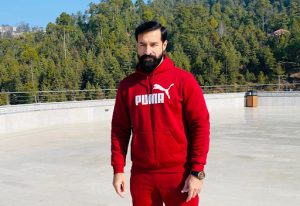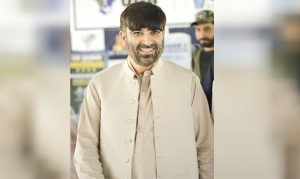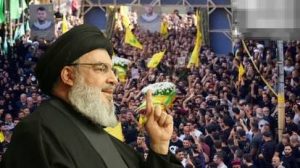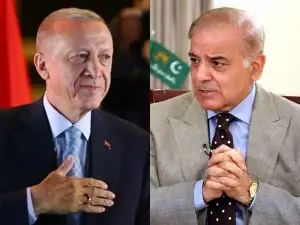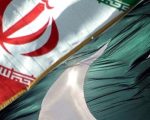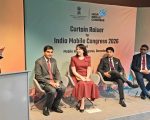Imran Ahmed Khan Niazi, popularly known as Imran Khan, is a former prime minister of Pakistan and the incumbent chairman of the Pakistan Tehreek-e-Insaf (PTI).
Khan, a cricketer-turned-politician, is a philanthropist and an international celebrity. He was born in Lahore on October 5, 1952.
Khan studied at the Cathedral School and then Aitchison College in Lahore. Later, he went to the Royal Grammar School, Worcester. He completed his education with an undergraduate degree in Economics, Political Science and History from Keble College, Oxford. He was made captain of the Oxford University cricket team in 1974.
Khan became one of the top all-rounders in the cricketing world after joining the Pakistan cricket team. He remained captain of the Pakistan cricket team for almost 10 years. His cricketing career in the national team started with his debut in 1971 and ended with the historic World Cup win in 1992.
Khan started playing cricket at the age of 13 and made his first-class cricket debut at the age of 16 in Lahore. In 1970-71, he played for domestic teams like Lahore A, Lahore B, Lahore Greens and Lahore. At the age of 18, Khan made his debut for the Pakistan National Cricket Team and played against England in 1971 at Edgbaston.
In August 1974, Khan made his debut in One-Day International (ODI) and played against England at Trent Bridge. After graduating from Oxford, Khan returned to Pakistan in 1976 and started playing in the Pakistan cricket team regularly. He played against New Zealand and Australia. He met Tony Greig on his West Indies tour and Tony signed Imran Khan for Kerry Packer’s World Series Cricket. This series proved impactful in Imran Khan’s growth and grooming in cricket.
Khan took part in the 1978 Perth World Bowling competition and came third in bowling at the speed of 139.7 km/h. Jeff Thomson and Michael Holding were ahead of Khan. Khan mastered the ‘reverse swing’ bowling technique and then transferred this technique to iconic Pakistani bowlers Wasim Akram and Waqar Younis.
In 1982, Khan took 62 wickets in 9 Test matches at the rate of 13.29 wickets per match. In January 1983, he achieved a Test bowling rating of 992 points while playing against India.
Khan is also known in Pakistan and globally for his philanthropic work. He launched the biggest crowd funding campaign to make his dream of building a cancer hospital in Pakistan a reality. Finally, he was able to complete the Shaukat Khanum Memorial Cancer Hospital and Research Centre (SKMCH&RC), a world class health facility for the treatment of poor cancer patients in Pakistan, on December 29, 1994. Today, the hospital treats 70 percent of its patients for free. In the last 29 years, the hospital has spent over Rs50 billion on the treatment of poor patients.
On April 25, 1996, Imran Khan jumped into politics and founded his own political party with the name Pakistan Tehreek-e-Insaf (PTI) or the Pakistan Justice Movement. In the 2002 general elections, Khan won a single seat in the National Assembly from his hometown of Mianwali.
Later, Khan set up Namal University in his hometown of Mianwali. The Namal University is affiliated with Bradford University of UK. Khan served as chancellor of Bradford University from November 23, 2005, to February 26, 2014. Khan stepped down as Bradford University chancellor in November 2014 citing his political commitments.
In 2008, Khan and his party boycotted the general elections. He opposed the US-administered drone strikes in Pakistan and Pakistan’s role in the US-led War on Terror. He raised over one billion rupees for survivors of the 2005 earthquake in Pakistan.
On October 30, 2011, Khan held a historic public gathering at Minar-e-Pakistan in Lahore. In the 2013 general elections, Khan’s PTI emerged as one of the leading parties in the Centre and formed government in Khyber Pakhtunkhwa.
In 2018, Khan’s PTI won a good number of seats in the Centre, Punjab and Khyber Pakhtunkhwa. He made a coalition government in the Centre and Punjab and an independent government in Khyber Pakhtunkhwa. On August 17, 2018, Imran Khan became the 22nd Prime Minister of Pakistan and on August 18 he took the oath of his office.
On April 10, 2022, Khan was removed from power through a vote of no-confidence led by the Pakistan Democratic Movement (PDM), an alliance of 13 political parties.
In October 2022, the Election Commission of Pakistan (ECP) ‘found’ Khan guilty of “corrupt practices” and disqualified him as a member of the parliament.
In November 2022, Imran Khan came under a gun attack in the Wazirabad town of Punjab while leading an anti-government rally. He survived the attack, but received three bullets in his legs.
Fast forward to May 9, 2023, Khan was arrested by the paramilitary forces on the premises of the Islamabad High Court (IHC) in the Al-Qadir Trust case. On May 10, a lower court in Islamabad handed over Khan to the National Accountability Bureau (NAB) on a physical remand.
On May 16, 1995, Khan married the 21-year-old Jemima Goldsmith at the age of 43. They have two sons together, Sulaiman Isa and Kasim. On June 22, 2004, the couple divorced after nine years of marriage because it was “difficult for Jemima to adapt to life in Pakistan”.
In January 2015, Imran Khan married British-Pakistani journalist Reham Khan at an intimate ceremony at his residence in Islamabad. However, Reham Khan stated in her autobiography that they got married in October 2014 but the announcement was made a bit late. On October 22, the couple announced divorce. In early 2018, Khan married his spiritual mentor Bushra Bibi.
On August 1, 2017, PTI MNA Ayesha Gulalai accused her party chief Imran Khan of harassing her and claimed that she had been receiving offensive messages from him since October 2013.
On January 7, 2018, PTI central secretariat issued a statement that Imran Khan proposed Bushra Bibi, but she had not yet accepted his proposal. On February 18, 2018, PTI confirmed Khan has married Bushra Bibi.



